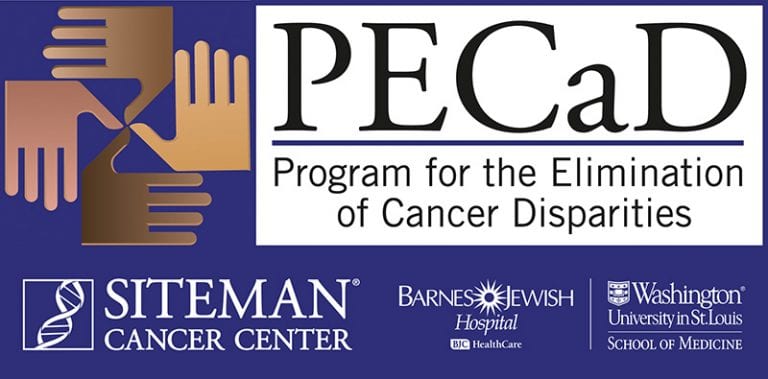Aimee James, PhD, MPH

Addressing Rural Cancer Health Disparities: SCC-SIUSM Partnership
Faculty involved: Graham Colditz, Aimee James, Erin Linnenbringer, Mary Politi, Siobhan Sutcliffe
The partnership between The Southern Illinois University School of Medicine and Siteman Cancer Center investigates rural cancer disparities and ways to help educate, train, and implement effective strategies to reduce the disparities seen in rural communities.
Community Engagement in Research
Faculty involved: Mary Politi, Bettina Drake, Esther Lu, Aimee James, Jean Hunleth, Erika Waters, PhD, MPH, Vetta Sanders Thompson, Graham Colditz
This line of research strives to engage all members of the community throughout the research process to help navigate the healthcare process.

Community Research Fellows Training Program
Faculty involved: Kia Davis (Program Director), Vetta Sanders Thompson (Past Program Director), Graham Colditz, Bettina Drake, Darrell Hudson, Aimee James, Erika Waters
This project focuses on engaging community members in the research process by providing fellows with the knowledge and skills to implement public health interventions in their own neighborhoods.
Improving Rural Colon Cancer Screening
Faculty involved: Aimee James, Esther Lu, Graham Colditz, Jean Hunleth
This project will address colorectal cancer mortality rates in rural Southern Illinois by improving the screening process and follow-up for patients who have a positive fecal blood test (FOBT, FIT).

Multi-disciplinary Approach to the Study of Chronic Pelvic Pain (MAPP) Research Network
Faculty involved: Siobhan Sutcliffe, Aimee James
The MAPP study is a cohort study of patients with interstitial cystitis/bladder pain syndrome (IC/BPS) and chronic prostatitis/chronic pelvic pain syndrome (CP/CPPS) from six sites across the United States. It was designed to better understand the natural history of these conditions and their underlying causes, taking a “whole-body” rather than a bladder- or prostate-specific approach.
Optimizing the Impact of Aspirin for Chemoprevention
Faculty involved: Yin Cao, Graham Colditz, Aimee James
Yin Cao, ScD, MPH, and colleagues will analyze the efficacy of aspirin for chemoprevention in colorectal cancer cases.

Prevention of Lower Urinary Tract Symptoms (PLUS) Research Network
Faculty involved: Aimee James, Siobhan Sutcliffe
The PLUS Research Network is a multi-site network designed to develop the evidence base for future clinical trials to prevent the development and progression of lower urinary tract symptoms in women and girls. Current projects include a qualitative focus group study, the development of new instruments to measure bladder health, systematic reviews of the literature, and analyses of existing study data to better understand bladder health and factors that contribute to the development and progression of lower urinary tract symptoms.
Program Evaluation of Community Engagement
Faculty involved: Aimee James, Graham Colditz, Vetta Sanders Thompson, Bettina Drake, Esther Lu, Jean Hunleth
Community-based participatory research (CBPR) helps give community members voice in academic research. These projects evaluated current and past CBPR projects to discovery future best practices.

Program for the Elimination of Cancer Disparities (PECaD)
Faculty involved: Graham Colditz, Aimee James, Bettina Drake, Vetta Sanders Thompson
The mission of Siteman Cancer Center’s Program for the Elimination of Cancer Disparities (PECaD) is to create a national model for eliminating local and regional disparities in cancer education, prevention and treatment. Through a community advisory committee and community partnerships, PECaD works with community representatives to find solutions that reduce disparities.
Supporting Cancer Patients Health Insurance Decisions
Faculty involved: Mary Politi, Aimee James, Esther Lu, Jean Hunleth
The goal of this grant from the American Cancer Society is to help cancer patients and survivors choose health insurance plans that best meet their health and financial needs. An existing decision support tool will be tailored based on patient interview data, and the modified tool will be evaluated with a 3-arm randomized trial.

Understanding & Addressing Cost Related Nonadherence to Medication
Faculty involved: Aimee James
Nonadherence can have significant negative health effects for the individual and contribute to increases in hospitalization, healthcare costs, and mortality. Adherence is a complex issue, but cost and affordability of medication is a common and critical barrier.The short-term objective is to identify how patients and healthcare providers approach affordability and adherence and use those data to refine and pilot test an intervention promoting patient-provider discussion about cost, affordability, and adherence. The long- term objective is to deliver interventions to reduce cost-related nonadherence.